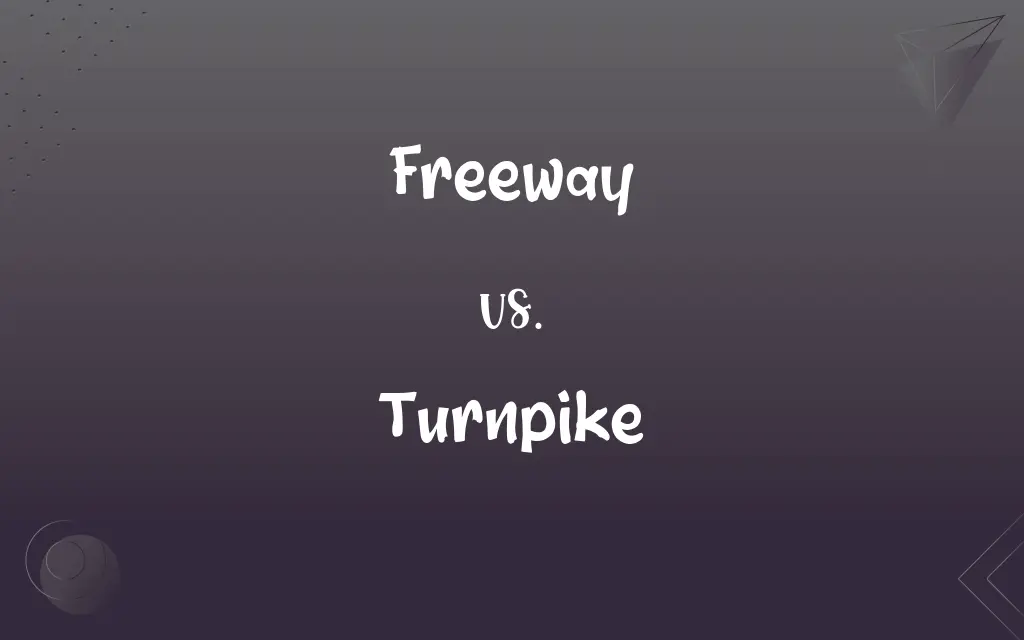Freeway vs. Turnpike: What's the Difference?
Edited by Aimie Carlson || By Janet White || Published on February 6, 2024
A freeway is a high-speed road designed for safe, efficient travel without tolls, while a turnpike is a toll road, often a major highway, where fees are charged for usage.

Key Differences
Freeways are major highways designed for high-speed travel, free from any kind of tolls or charges. They facilitate quick and efficient transportation and are a critical part of the road infrastructure in many countries. Turnpikes, in contrast, are toll roads where drivers must pay a fee to use them. The fees collected are often used for the road's maintenance and infrastructure development.
In terms of access, freeways usually have controlled access points to manage traffic flow and ensure safety. They are designed to be free from stoplights, intersections, and pedestrian crossings. On the other hand, turnpikes may have similar access control but are distinguished by toll booths or electronic toll collection points, which can occasionally lead to slower traffic flow at these points.
Freeways often run through urban and suburban areas, providing direct routes without the need for stops. This design is aimed at reducing congestion and allowing for continuous, high-speed travel. Turnpikes, while also designed for long-distance and high-speed travel, are often found connecting major cities and can be part of larger interstate highway systems.
The funding and maintenance of freeways come from general public funds, such as taxes. This is why they do not charge drivers directly for their use. In contrast, turnpikes are typically funded and maintained through the tolls collected from the users, which can mean better maintenance and facilities in some cases.
Historically, freeways were developed to ease congestion in populated areas and create efficient travel routes across cities and states. Turnpikes have a longer history, initially being toll roads developed by private companies or local entities to fund their construction and maintenance.
ADVERTISEMENT
Comparison Chart
Tolls
No tolls
Charges tolls
Funding
Public funds
Tolls collected
Traffic Control
Controlled access, no intersections
Controlled access, toll booths
Primary Purpose
Efficient, high-speed travel
Long-distance, high-speed travel
Historical Origin
Developed for urban efficiency
Originally private roads requiring funding
ADVERTISEMENT
Freeway and Turnpike Definitions
Freeway
A road designed for fast, uninterrupted travel.
The freeway allows us to bypass the city traffic.
Turnpike
A highway where drivers pay a fee to use.
You'll need change for the tolls on the turnpike.
Freeway
Part of a city's transportation system.
The new freeway will improve connectivity between the suburbs and downtown.
Turnpike
Points where drivers pay tolls.
There are several toll booths along the turnpike.
Freeway
A road without toll charges.
I prefer taking the freeway to avoid toll costs.
Turnpike
A major part of the interstate highway network.
The turnpike connects to several major interstate highways.
Freeway
A road with limited entry and exit points.
The freeway's controlled access prevents sudden traffic merges.
Turnpike
Road maintenance funded by tolls.
Turnpike tolls contribute to its upkeep and expansion.
Freeway
A road maintained by public funds.
This freeway was recently widened using state funds.
Turnpike
A road used for traveling between cities.
The turnpike is the fastest route to the next state.
Freeway
See expressway.
Turnpike
Abbr. Tnpk. or Tpk. A toll road, especially an expressway on which tolls are charged.
Freeway
A highway without tolls.
Turnpike
A tollgate.
Freeway
(In parts of Canada, the U.S. and Australia) A highway with grade-separated crossings (rather than level crossings) and designed (and only permitted) for high-speed motor-traffic running in two directions on one separate carriageway each
Freeway
A toll-free highway.
Freeway
A broad highway designed for high-speed traffic
FAQs
Why are freeways important in urban areas?
Freeways reduce congestion and provide efficient travel in urban areas.
Are turnpikes safer than freeways?
Safety depends on various factors, not just the type of road.
What's the main difference between a freeway and a turnpike?
The main difference is that freeways are toll-free, while turnpikes charge tolls.
Do turnpikes always have toll booths?
Most have toll booths, but some use electronic toll collection systems.
Can both freeways and turnpikes have multiple lanes?
Yes, both can have multiple lanes to accommodate heavy traffic.
How are turnpike tolls calculated?
Tolls can be flat-rate or based on distance traveled.
How do electronic tolls on turnpikes work?
Electronic tolls automatically charge a registered account or device as the vehicle passes through.
Are there speed limits on freeways?
Yes, freeways have speed limits to ensure safety.
Do all states in the U.S. have turnpikes?
No, not all states have turnpikes.
Is it faster to travel via turnpike?
Turnpikes can offer faster travel, especially for long distances.
Can bicycles use freeways?
Bicycles are generally not allowed on freeways for safety reasons.
Can you avoid tolls on a turnpike?
Alternative routes can be used to avoid turnpike tolls.
Are there weight limits for vehicles on turnpikes?
Yes, turnpikes may have weight limits to protect road integrity.
Do freeways have traffic lights?
No, freeways are designed without traffic lights for continuous flow.
Can you pay turnpike tolls with a credit card?
Many turnpikes now accept credit cards or electronic payments.
Do freeways have rest stops?
Many freeways have rest areas for long-distance travelers.
Do freeways connect to other major roads?
Yes, freeways often connect to other highways, roads, and city streets.
Can freeways be converted into turnpikes?
Technically yes, but this is rare and would involve significant policy changes.
Why do some drivers prefer turnpikes?
Drivers may prefer turnpikes for their well-maintained roads and convenience for long trips.
Are turnpikes more common in certain parts of the U.S.?
Yes, turnpikes are more common in the Northeast and Midwest U.S.
About Author
Written by
Janet WhiteJanet White has been an esteemed writer and blogger for Difference Wiki. Holding a Master's degree in Science and Medical Journalism from the prestigious Boston University, she has consistently demonstrated her expertise and passion for her field. When she's not immersed in her work, Janet relishes her time exercising, delving into a good book, and cherishing moments with friends and family.
Edited by
Aimie CarlsonAimie Carlson, holding a master's degree in English literature, is a fervent English language enthusiast. She lends her writing talents to Difference Wiki, a prominent website that specializes in comparisons, offering readers insightful analyses that both captivate and inform.






































































